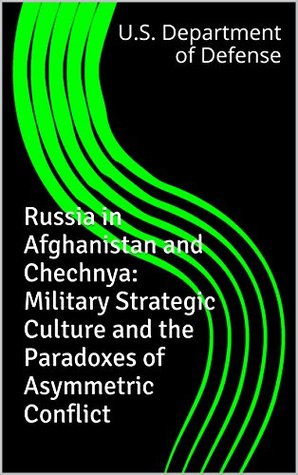Read Russia in Afghanistan and Chechnya: Military Strategic Culture and the Paradoxes of Asymmetric Conflict - U.S. Department of Defense file in PDF
Related searches:
The Secret Battles Between US Forces and Chechen Terrorists
Russia in Afghanistan and Chechnya: Military Strategic Culture and the Paradoxes of Asymmetric Conflict
The Secret Battles Between US Forces and Chechen - ABC News
Russia, Chechnya and the international community - Humanitarian
Welcome back from hell Soldiers from the wars in Afghanistan and
Chechnya, Yeltsin, and Clinton: The Massacre at Samashki in
Russia in Afghanistan and Chechnya - Army War College Publications
Russia in Afghanistan and Chechnya: Military Strategic - DTIC
Russia In Afghanistan And Chechnya: Military Strategic Culture And
Russia in Afghanistan and Chechnya : military strategic culture and
Lessons from Afghanistan and Chechnya: - 2020 Online
Export of Holy Terror to Chechnya From Pakistan and Afghanistan
The Lost American - Killing Chechnya FRONTLINE PBS
Russia at War: From the Mongol Conquest to Afghanistan
“Russia in Afghanistan and Chechnya: Military Strategic
Russia has a model for peace and stability for Afghanistan–it
Afghanistan And Chechnya: Low Intensity Preludes To Another
The Other Side of the COIN: The Russians in Chechnya Small
Russia's long history of war and trade in central asia and afghanistan in the moslem-dominated republic of chechnya, russia has battled al-qaeda-trained.
Russia in afghanistan and chechnya: military strategic culture and the paradoxes of asymmetric conflict. Categories articles tags afghanistan� asymmetric conflict� chechnya� paradoxes� russia� strategic culture post navigation.
In chechnya, the russian government is locked in a deadly struggle with a the 15,000 to 20,000 soviet soldiers lost in then years of fighting in afghanistan.
Chechnya were almost the same as the goals sought in afghanistan 15 years earlier-to implant a pro-russian government and to stabilize the chechen republic. Russian forces pulled out of chechnya almost 2 years later after suffering close to 6000 killed, having failed to meet their objectives.
The soviet–afghan war was a conflict wherein insurgent groups (known collectively as the mujahideen), as well as smaller maoist groups, fought a nine-year guerrilla war against the soviet army and the democratic republic of afghanistan government throughout the 1980s, mostly in the afghan countryside.
Afghanistan and chechnya were: 1) the structure of the international system underwent an enormous change— from bipolar to unipolar; and 2) russia ceased to be a great.
In the largest russian military offensive since the 1979 invasion of afghanistan, thousands of troops and hundreds of tanks pour into the breakaway russian republic of chechnya.
The first chechen war (russian: пе́рвая чече́нская and russia's deputy minister of defense general boris gromov (esteemed commander of the afghan war), also resigned.
Special operations forces have repeatedly engaged in fierce combat in afghanistan against ruthless taliban allies from chechnya, who have the same pedigree as their terrorist brethren threatening to disrupt the winter olympics in russia, current and former commandos tell abc news.
From the mongol conquest to afghanistan, chechnya, and beyond.
The author uses a detailed assessment of the russian experience in afghanistan and chechnya to draw important conclusions about asymmetric warfare. Major cassidy points out that small wars are difficult for every great power, yet are the most common kind.
Russia has a model for peace and stability for afghanistan–it’s called chechnya one only needs to study russia’s experience with bringing former chechen rebels to the table, in order to learn why the taliban must be spoken to rather than bombed into anger and alienation.
Radical islamists from chechnya and other north caucasian republics have been held responsible for a number of terrorist attacks throughout russia, most notably the russian apartment bombings in 1999, the moscow theater hostage crisis in 2002, the beslan school hostage crisis in 2004, the 2010 moscow metro bombings and the domodedovo.
This is the largest military action by russia's armed forces since the invasion of afghanistan. Large-scale clashes ensue between russian troops and chechen.
Jul 28, 2015 post-traumatic stress disorder (ptsd, also referred to as the “afghan syndrome” or the “chechen syndrome” in russian) is a psychological.
As the soviet union broke up in 1991, chechnya declared independence from the russian federation.
By late january 2000, russian forces established positions in the northern part of the country and some.
Nevertheless, unlike afghanistan, chechnya had been considered a russian territory for a very long time and the first war was essentially an issue of contested sovereignty. Elites in grozny saw the breakup of the soviet union as a chance to follow estonia’s example and set up their own ethnic republic while moscow disagreed.
Afghanistan initiated a new era and chechnya represents another phase in a new russian process of lic interaction. In order to better understand this phenomenon, the remainder of this analysis.

Post Your Comments: